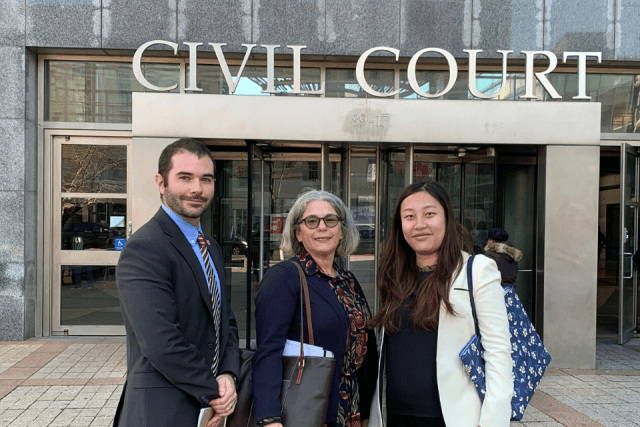
L-R: Dan Drury '20, Helen Wrobel '94, and Rita Wang ‘19LL.M
Weeks after Superstorm Sandy devastated parts of coastal New York City, Helen Wrobel ’94 was in a van with St. John’s Law alumni, faculty members, and students who had volunteered to help victims of the disaster. It was a trip that would change her life.
“I was sitting next to Professor Ann Goldweber, who directs the Law School’s clinical legal education program as well as its in-house Consumer Justice for the Elderly: Litigation Clinic, and she told me that she had just secured a grant from the New York State Courts Access to Justice Program for St. John’s to operate two pro bono programs in the Queens County courts,” Wrobel explains. “Ann was looking for someone to run the programs, and I was looking for a change from my longtime, union-side labor law practice. So I jumped at the opportunity.”
Under the grant, for the past eight years Wrobel has overseen the Volunteer Lawyer for the Day (VLFD) Consumer Debt Program that provides limited representation to pro se defendants in consumer debt cases in Queens Civil Court. Supervised St. John’s Law student and alumni volunteers negotiate settlements with opposing counsel, get default judgments vacated and cases dismissed for lack of jurisdiction, conference with court attorneys, argue before judges, and advise clients on trial strategies. St. John’s volunteers also participate in the Uncontested Divorce Program, working under attorney supervision to prepare uncontested divorce papers and to walk pro se litigants through the divorce process. The volunteers, who undergo training for each program, can earn pro bono credits that help them meet the 50-hour pro bono service requirement for admission to the New York Bar.
The numbers speak to the success of both programs. Since they started, dozens of St. John’s Law volunteers have helped thousands of New Yorkers navigate the complex civil court system. This grant year alone, the VLFD Consumer Debt Program has provided representation to 386 pro se defendants. And 52 pro se litigants have had their uncontested divorce papers prepared by St. John’s volunteers, who have also advised 93 pro se litigants on filing for an uncontested divorce.
“These two programs have become an important part of our pro bono offerings and serve to enhance St. John’s Vincentian Mission,” says Professor Goldweber, whose clinic students participate in the VLFD Consumer Debt Program. “It’s an eye-opening experience for our students to see the inequities in our court system. In these cases, the debt collection companies are always represented by counsel, while the low-income defendants almost never have lawyers. Our representation helps to level the playing field.”
When he first volunteered for St. John’s Access to Justice programs, Dan Drury ’20 was looking to fulfill his 50-hour pro bono requirement while doing something meaningful. But he didn’t anticipate the immediate impact he would have on people’s lives. “I came to law school expecting to do transactional work after graduation,” he says. “I didn’t really comprehend the difference attorneys can make in a person’s life until I started volunteering. Though we’re not engaging in appellate level lawyering or courtroom theatrics, our knowledge is still a huge benefit to the average person off the street. If I’ve helped a client understand the importance of avoiding a default or helped them avoid an unnecessary and onerous settlement, it’s often more than they would have been able to do on their own.”
Rita Wang ‘19LL.M., who is from China, earned her Master of Laws at St. John’s, and passed the New York Bar recently, agrees that volunteering in the programs has brought unexpected personal and professional rewards. “As I volunteered, I gradually gained the knowledge and skills to take care of cases,” she shares. “My mother language is not English, and I lack understanding of many aspects of American society. So I was not very confident about myself in court. But as time went by and I volunteered more, things changed. Even after I accomplished the 50 hours of service, I decided to continue volunteering. I love the feeling that I can help people.”
As she guides the VLFD Consumer Debt Program and the Uncontested Divorce Program, Wrobel sees clearly how students like Drury and Wang benefit from the experience. “They gain ‘real world’ legal skills outside of the classroom in their interactions with litigants, judges, opposing counsel, and courthouse staff, and they grow as individuals and lawyers by serving members of the community who are going through a tough time,” she says. “But, just as importantly, our volunteers come to appreciate that they can do pro bono work throughout their legal careers that uplifts people while bridging the justice gap in and beyond New York.”
Related News
St. John’s Law Students Volunteer to Close the Justice Gap for New Yorkers
On Friday afternoons, Room 116 in the Queens County Civil Courthouse becomes a bridge between classroom learning, community service, and justice in action for a dedicated group of St. John’s Law...
Law Matters: A Conversation With Professor Robin Boyle-Laisure
In this installment of our Law Matters story series, Dean Jelani Jefferson Exum speaks with Professor Robin Boyle-Laisure about her scholarship and advocacy addressing cults and human trafficking...
St. John’s University School of Law Receives Historic Gift to Name DiMartino/Smith Public Interest Center
Dean Jelani Jefferson Exum has announced that the Public Interest Center at St. John’s Law will be named the DiMartino/Smith Public Interest Center in honor of alumna Rose DiMartino ’81 and her spouse...
